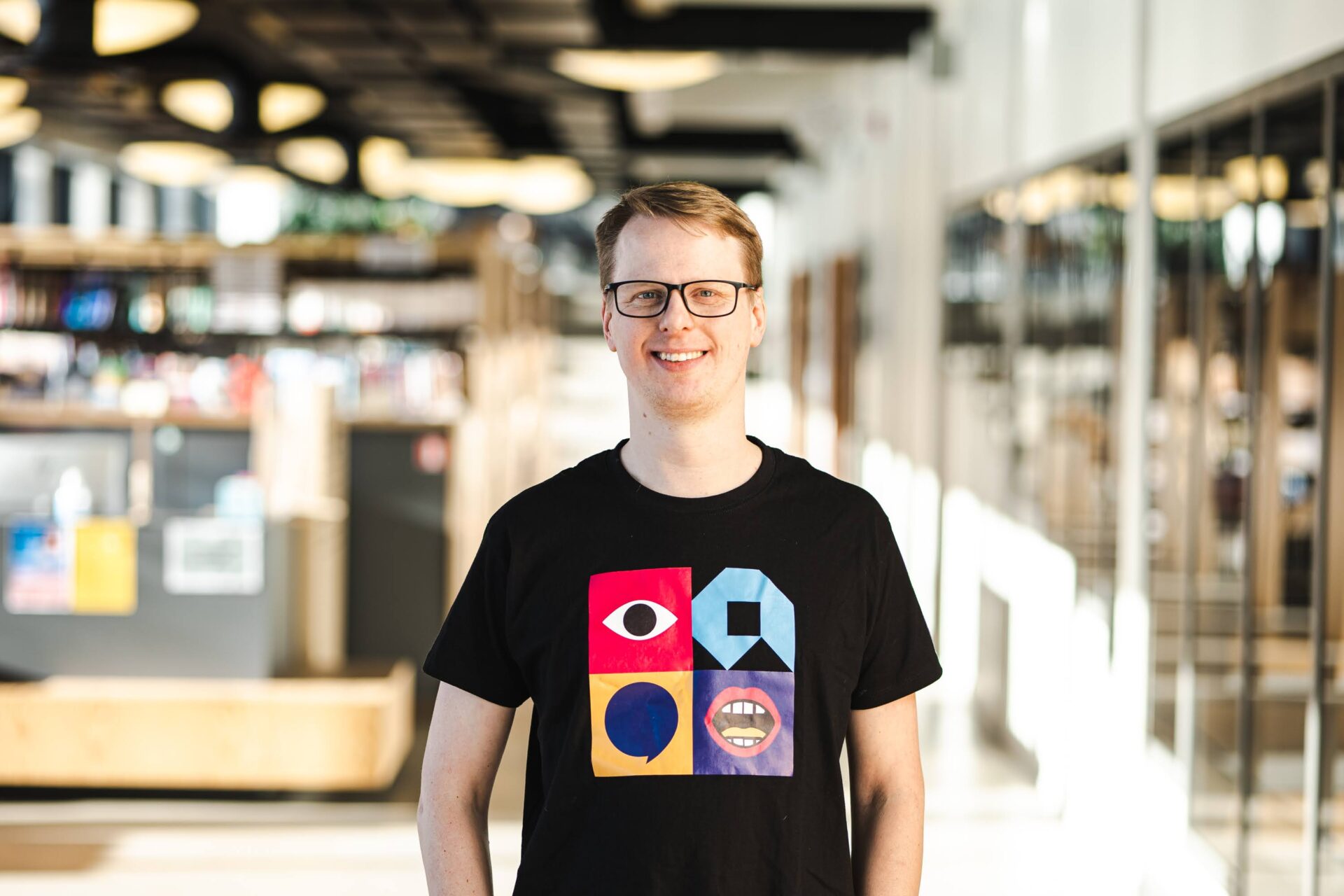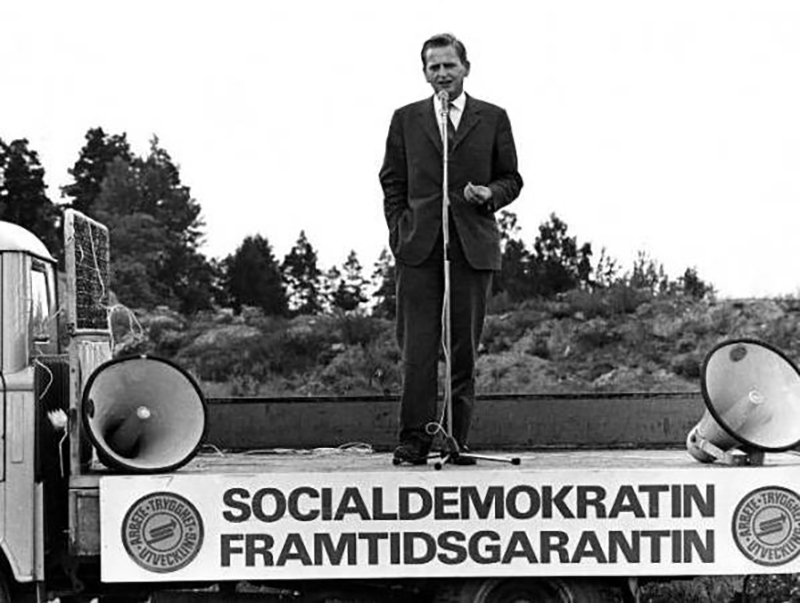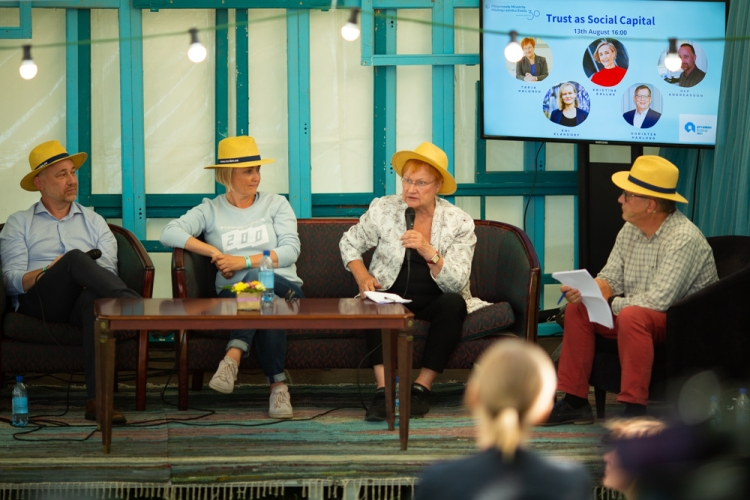Dozens of debates on various topics will be held in almost twenty areas at the Opinion Festival, which will be held in Paide on 11 and 12 August this year. Between the debates, you can listen to music, visit an exhibition and learn about the city of Paide and its history.
Kaspar Tammist, the Head of the Opinion Festival, says that the Opinion Festival probably differs from other festivals due to the fact that it places the emphasis on the quality of the debates. “We train and coach the organisers of the debates considerably more than others, and we give them a mentor if the wish to have one,” explains Tammist. “It’s also very important to us that the content of the festival programme corresponds to the entire vision of the festival.”
This means that a lot of emphasis is placed on the development of the debate culture and how the organisers of debates can apply things they’ve learnt in their everyday lives and work. “As we regard festivalgoers also as participants, we hope that they’ll also acquire the skill of recognising a good debate and will keep spreading it.” Tammist adds that the people who organise and participate in the debates as well as all festivalgoers are expected to follow good debating practices.
One of the key objectives of the Opinion Festival is to “reach” young people. “A year ago, we started a project with Paide Upper Secondary School, where young people can learn debate culture through electives,” says Tammist. The project will hopefully raise a new generation of good debaters.
Nordic-Baltic network of democracy festivals
The Opinion Festival is part of the Nordic-Baltic network of democracy festivals through which the festival organisers of different countries can exchange experiences and knowledge to promote participatory democracy even more successfully. The Nordic Council of Ministers also supported the creation of the platform for democracy festivals.
“The presence of official Nordic cooperation in political and social debates in both the Nordic and Baltic countries reflects a shared appreciation of the debate culture and, more broadly, support for the development of a common identity in the region,” explains Merle Kuusk, Adviser at the Nordic Council of Ministers' office in Estonia.
According to Tammist, the main objective of the network is to be in the same information space, exchange experiences and learn from each other. “Of course, this also includes visiting each other’s festivals,” says Tammist and adds that this autumn, all the other democracy festival leaders in the region are expected to meet in Paide and exchange experiences.

Head of the Estonian Opinion Festival Kaspar Tammist and one of the main pillars of the festival Maiko Kesküla. Photo: Opinion Festival
The idea of the Opinion Festival is linked to the former Swedish prime minister
According to Mikael Carboni Kelk, Senior Adviser to the Nordic Council of Ministers and Project Manager of the Democracy Festivals of the Nordic Council of Ministers, the history of such festivals dates back to 1968, when former Prime Minister Olof Palme and the Swedish Social Democratic Party held their annual summer meetings in Visby on the island of Gotland in Sweden. At this event, Palme engaged directly with the crowd, standing in the back of a truck.
And precisely because this moment in Swedish history is considered the birth of democracy festivals, it seemed a logical step for Merle Kuusk to have the Estonian Office of the Nordic Council of Ministers participate in the Opinion Festival.
“The main event of the summer on Gotland was born from this debate in 1968 – the Almedalen Political Week (Almedalsveckan – Ed.),” says Kuusk. “The event, which became extremely popular among politicians, opinion leaders, experts and reporters has inspired other Nordic countries, the Baltic states and the rest of the world to organise similar weeks or days of debates.”
The first official democracy festival called Almedalsveckan was held in 1982. After a while, other political parties, NGOs, interest groups and, of course, interested people joined the meetings.
“Inspired by Almedalsveckan, the Danish democracy festival Folkemødet was launched in 2011. Norway came out with its Arendalsuka a year later. Before that, a jazz festival held in Finland was combined with the democracy festival called SuomiAreena. Iceland also has its democracy festival, which was previously held far in the northern part of the country, but will be hosted by the capital Reykjavik this year,” lists Kelk.
The Nordic Council of Ministers does not take part in the Paide Opinion Festival alone. Every summer, important issues are raised through debates and events in Denmark, Sweden, Finland, Norway, Iceland, Latvia and Lithuania. “In 2016, a similar event was held for the first time in Greenland and it’s called Qassimiuaarneq,” says Kuusk. “Latvia has been hosting the LAMPA Conversation Festival since 2015. One of the initiators of the festival was the Latvian Office of the Nordic Council of Ministers, which also participated in this years’ debates in Cēsis.”
The festival launched in Lithuania in 2017 is called Būtent!

Former Swedish Prime Minister Olof Palme engaged directly with the crowd, standing in the back of a truck in 1968. Photo: Wikipedia
Why do we need a democracy festival?
Kristi Liiva, the initiator of the idea of the Opinion Festival has said that the Opinion Festival is one of the few events where people from state agencies and NGOs, cultural figures, entrepreneurs, universities, reporters and citizens, all of whom are part of the common debate culture of Estonia, can meet.
“We need democracy festivals because they’re important platforms where ordinary people can exercise their democratic rights to talk to those in power,” says Kelk. “As we can see when looking at what’s going on in the world today, we cannot take these rights for granted.”
He also believes that cooperation between festivals is important. “We draw inspiration from each other, innovate the concept and adapt it to the national context,” he explains.
For Kelk, the most interesting and important thing he has learnt so far from democracy festivals is that political parties, people and NGOs can agree to disagree with each other. “And yet, this does not prevent them from sitting down and having a beer together.”
What does the future hold?
Tammist believes that democracy festivals, including the Opinion Festival, certainly have a future. “I think that the Opinion Festival will still be here in 20, even 30 years, because Almedalsveckan, for example, has been around for more than 50–60 years,” he says and adds that the natural potential for continuing with the festival exists in Estonia.
However, Tammist cannot predict the format and the way in which the Opinion Festival will be organised in the future. “The management logic of the festival is that the leader changes every three to five years. My time in this position will end with the festival of 2024 and a new leader will arrive, who will steer the ship according to their vision.”
Three days of debates instead of two
However, Tammist admits that if he had to lead the festival for a couple of more years, he would certainly add another day.
Namely, the core of the festival has reached a situation where the debates offered to the festival are all so good and interesting that selecting the best of the best is becoming increasingly difficult. “I think a third day should be added, but there’s now a very strong debate about whether it should be Thursday or Sunday, because the festival currently takes place on Friday and Saturday.”
The official cooperation of the Nordic countries at the democracy festivals of 2023 focuses on positive conversations about the green transition, defence and security, and how to sustain and strengthen our democracies.
This year, the Nordic Council of Ministers and the Nordic Council will take part in eight democracy festivals in Denmark, Sweden, Finland, Norway, Iceland, Estonia, Latvia and Lithuania.
Answers to many questions will be sought, including how we can create tangible solutions to realise the vision of the Nordic Council of Ministers – the Nordic Region becoming the most sustainable and integrated region in the world.
Formal Nordic cooperation at this year's democracy festivals will cover a wide range of topics, with special attention given to the green transition, energy security and the participation of young people in society.
At the debates of the Nordic Council of Ministers, experts, activists and politicians of various levels discuss the areas where the Nordic countries work together to ensure that we as a region are better prepared to cope with the great challenges of the day.
Nordic institutions are key contributors to several festivals. Nordic Innovation, Nordic Energy Research, Nordregio, Nordforsk and Nordgen play an important role in funding innovation and research, and in improving Nordic networking and knowledge exchange in a wide range of areas such as health technology, energy and food security.
On 11 August, the Estonian Office of the Nordic Council of Ministers will also participate in the Opinion Festival with two debates. The name of the Norden area is Resilience (“Säiliv ja nõtke” in Estonian). Two topics will be discussed with Estonian and Nordic speakers (in English with speech-to-text reporting in Estonian):
• At 2 pm EET: The Happy Place – Stuck in a Purgatory of Your Work Life
• At 4 pm EET: Greenwashing Takes a Toll on Green Transition
“Our goal is to raise important issues in society and exchange experiences between Estonia and the Nordic countries in debates,” says Kuusik. “Over the years, thanks to the Opinion Festival, the NCM has brought together experts, politicians, public officials, entrepreneurs, opinion leaders and creatives from the Nordic countries and Baltic States to discuss how to overcome obstacles we all face.”
She adds that there have been debates about culture, welfare, the green and creative economies, gender equality, the digital world and the links between research and enterprise. “The Opinion Festival has been a valuable platform for discussing these issues with people who are interested in making the world a better place and willing to act in order to achieve it.”
Examples of the most exciting debates of Nordic Council of Ministers' Estonian office over the years
“Trust as social capital”:
In the Nordic countries, people have a high level of trust in politicians, the government and each other. Thanks to this, the level of social capital in the Nordic region is high and 1+1 adds up to more than 2. The debate focused on how to increase trust and social capital. Is trust something permanent or is it constantly evolving? Why is a crisis an opportunity to foster trust? How are trust and social capital linked to happiness? If you would like to know the answers, watch the recording here: https://www.youtube.com/watch?v=NjlW4QNa9FY
“Diversity - a tool for successful business”:
When asked whether diversity at the workplace should be discussed, the majority of the people listening to the debate answered ‘yes’, although many of them admitted that they see no shortcomings at their own workplaces. When the panellists were asked what could be done in the case of different kinds of discrimination, they answered that it could be tolerance, noticing the people around us, creating opportunities for getting to know each other (meetings, dialogues), the will of citizens and submitting demands to political forces – if there is no demand, there is also no supply. The video in English (with translation into sign language) is here: https://www.youtube.com/watch?v=zaT0qSFf7Uc&t=8s
Opinion Festival 2022: “Navigating next-gen technologies for culture”
The digitalisation of culture – a new trend in the creative economy that is here to stay. Art’s becoming digital, investors are buying NFT artworks and galleries are going virtual. That’s why there was a discussion of what these new business models are like, how to manage cultural organisations in the future and what will become of art. Interesting keywords were “Digital wardrobe vs physical wardrobe”, “Metaverse Fashion Week”, “Digital art vs physical art”, and so on. Read more about the content here. Recording: https://www.youtube.com/watch?v=Yd041afGfb4

